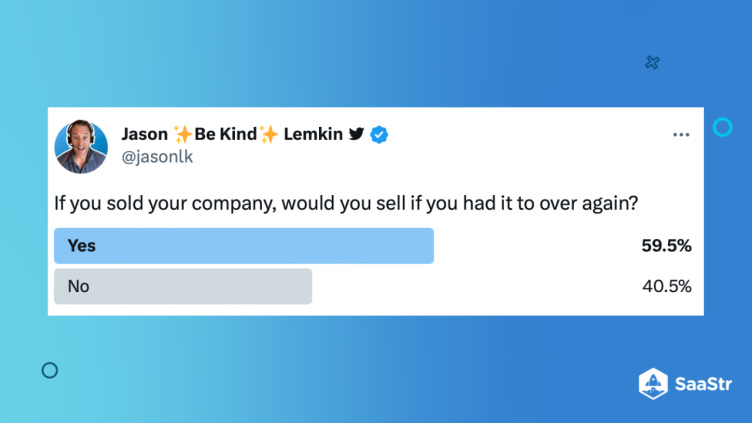When Should You Sell Your Startup?
"But even if you can go do another start-up … you can only do so many."
o get all the best SaaStr content delivered directly to your inbox weekly, subscribe for free here.
Having been through the acquisition process 4x — twice as a founder, twice as a start-up exec, here’s my list of when and if to sell. Don’t take it literally. Most startups never get a single good acquisition offer, ever. So logic does state, take the best, good offer you get. It may be your last. But we are founders. We aren’t always wired that way.
So just to spur some thinking, my list of When A Start-Up Should Get Acquired:
1. Before You Fail / Run Out of Money / Etc. If you are slightly hot but with few revenues, or have something but not enough, sell while you still have time. Don’t wait until you have 30 days of cash. Way, way too many start-ups wait too long in this scenario.
2. When the Team Isn’t Good Enough. Even if you are growing nicely and even cash-flow positive, and all the quantitative metrics look good … if the team isn’t good enough, and can’t fix itself — sell if and when you can. Bad teams kill start-ups. Every day. Sell before then if you can’t fix it. Sometimes great individuals just don’t make great teams, and it can’t be fixed. It’s sad. But not uncommon.
3. When the Economics, to Everyone, Exceed Your Magic Number. I don’t know what your Magic Number is. But you will. It may be $19 billion. It may be $1 million. The Magic Number isn’t rational, really, and can’t be 100% explained on a spreadsheet. It is something that makes it all right. Sometimes, there is No Magic Number. Which is great, too. Sometimes, you’ll never sell. But often, there is a magic number.
Ryan Smith, co-founder and the CEO of Qualtrics, and I discussed this math around their $8 Billion acquisition here:
This edition of the SaaStr Insider is sponsored by Secureframe.
OK that’s the easy part. The more interesting part is When Not to Sell. My Learnings:
1. Usually — Do Not Sell If You Are At Scale and Have a Committed Team. This is pretty much it for me. E.g., in SaaS, if you are at $10m+ ARR, and growing nicely, and the team is killing it — just don’t sell. You don’t have to listen to me. But once you are at Scale in SaaS, you can’t be killed. Why sell? Really. You’ll keep adding value every year.
2. Do Not Sell Because of the Competition, Unless They Are Truly Decelerating You and You Can’t Stop Them. There is always competition. Google threatens to kill you if you don’t sell? Whatever. They can’t kill you if you are growing. A hot start-up nipping at your heels? That’s the way it should be. As long as you can hit your plan, it doesn’t really matter.
3. Do Not Sell Because You are Tired. Or At least — Try To Fix This First. This is the dirty “secret” of M&A. If you look at a lot of successful start-ups that seem to get acquired out of nowhere … that have traction, great customers, and all that … there’s often a story. It’s called the 5 Year Walk of Death. You get so tired after 4 years, then you stumble through the 5th, and then, you take an offer. Don’t let it happen. Bring in fresh blood, fresh capital, whatever it takes. I know of one Top Tier VC Fund that specifically targets Exhausted Founders After 5 Years, makes crappy offers but with a lot of secondary liquidity … they know it’s a weak moment.
My learnings.
You only get so many at-bats. Money is good. Take it. It gives you options. And makes you braver, maybe, next time.
But even if you can go do another start-up … you can only do so many. If you have something real, something good, something self-sustaining, something unkillable. Which is hard. But then, you did something magical. You brought something real into the world. Probably, don’t sell. Period.
This edition of the SaaStr Insider is sponsored by SAP.



